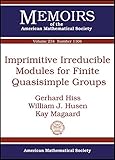Imprimitive irreducible modules for finite quasisimple groups / Gerhard Hiss, William J. Husen and Kay Magaard.
Material type: TextSeries: Memoirs of the American Mathematical Society ; v 234, no 1104.Publication details: Providence : American Mathematical Society, 2015.Description: v, 114 p. ; 26 cmISBN:
TextSeries: Memoirs of the American Mathematical Society ; v 234, no 1104.Publication details: Providence : American Mathematical Society, 2015.Description: v, 114 p. ; 26 cmISBN: - 9781470409609 (pbk. : acidfree paper)
- 510 23 Am512
| Item type | Current library | Call number | Status | Date due | Barcode | Item holds | |
|---|---|---|---|---|---|---|---|
| Books | ISI Library, Kolkata | 510 Am512 (Browse shelf(Opens below)) | Available | 136687 |
Includes bibliographical references.
Chapter 1. Introduction
Chapter 2. Generalities
Chapter 3. Sporadic Groups and the Tits Group
Chapter 4. Alternating Groups
Chapter 5. Exceptional Schur Multipliers and Exceptional Isomorphisms
Chapter 6. Groups of Lie type: Induction from non-parabolic subgroups
Chapter 7. Groups of Lie type: Induction from parabolic subgroups
Chapter 8. Groups of Lie type: char$(K) = 0$
Chapter 9. Classical groups: $\text {char}(K) = 0$
Chapter 10. Exceptional groups
Bibliography.
Motivated by the maximal subgroup problem of the finite classical groups we begin the classification of imprimitive irreducible modules of finite quasisimple groups over algebraically closed fields K. A module of a group G over K is imprimitive, if it is induced from a module of a proper subgroup of G. We obtain our strongest results when char(K) = 0, although much of our analysis carries over into positive characteristic. If G is a finite quasisimple group of Lie type, we prove that an imprimitive irreducible KG-module is Harish-Chandra induced. This being true for char(K) different from the defining characteristic of G, we specialize to the case char(K) = 0 and apply Harish-Chandra philosophy to classify irreducible Harish-Chandra induced modules in terms of Harish-Chandra series, as well as in terms of Lusztig series. We determine the asymptotic proportion of the irreducible imprimitive KG-modules, when G runs through a series groups of fixed (twisted) Lie type. One of the surprising outcomes of our investigations is the fact that these proportions tend to 1, if the Lie rank of the groups tends to infinity. For exceptional groups G of Lie type of small rank, and for sporadic groups G, we determine all irreducible imprimitive KG-modules for arbitrary characteristic of K.
There are no comments on this title.



























